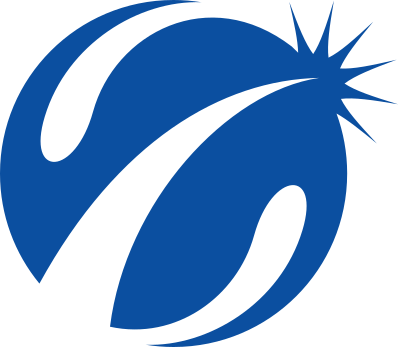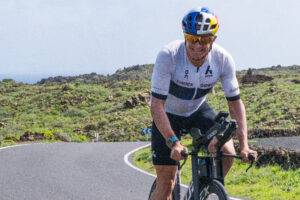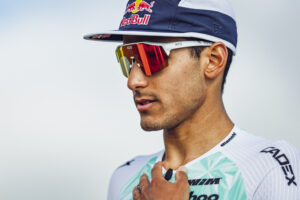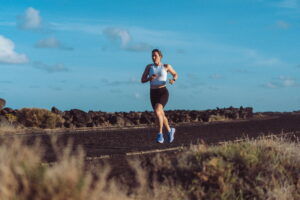Jonas Colting and the Soul of Ultraman Hawaii

Here is the second part of the conversation with Ultraman Hawaii winner Jonas Colting. He tells us what the race was like and how he prepared for this grueling event. Part 2 of 2.
DP: Let’s talk about the Ultraman race for a bit. The swim was supposedly quite slow. It seems that they put an Endless Pool towards the end of the swim course and plunked you guys into it, to the point that you were making no progress and the jellyfish were literally swimming faster…what was the current like and were the jellyfish an issue this year?
Jonas: I was flying the first 90 minutes! I didn’t even break my stroke to drink. Once we hit km 8, the currents changed. I remember seeing the Outrigger Hotel on my left for about 30 minutes and it was demoralizing. But what can you do but push on? So I did and I was happy to turn into the bay. I didn’t see any jellyfish whatsoever and never have in Hawaii although I’ve been wary of them since Gordo had his little run-in with one at the 2003 race and nearly died!
DP: Most athletes never get off the QueenK during their trip to Hawaii. The Ultraman bike course is incredible. Give us your quick "tour" of the island. What are the magical moments on that course? The climbing is not far off some Tour de France mountain stages. Tell the readers more about it.
Jonas: Yes, I can’t believe how boring Queen K really is compared to some of the other roads on Hawaii. The two bike-days of Ultraman are great in terms of scenery and sightseeing, but very, very hard! I had about 2500 meters of climbing each day.
On the first day you get out of the water after 10 k and climb straight away with the sun beating down hard. Once you get up it’s a winding ride through rainforests and plantations before there’s a nice relief when you coast back down to sea level just along the islands south tip. That’s when the real riding starts! The last 40 k of the first day is uphill and with about 4000 feet of climbing! In 2004 the winds were miniscule and it even rained which was great but this year it was a straight headwind with sun! The landscape is fascinating as you enter the Volcanoes National Park but I was suffering so much this year I had a hard time even staying on my bike. It was truly the hardest ride of my life and the entire first day this year with the stronger currents on the swim stands out as the toughest 7 hours of racing in my life!
DP: That is really interesting. It sounds like each day is like doing the Alpe d’Huez twice in terms of climbing, the heat of Hawaii, winds, Paris Bruxelles distances and a large dosage of suffering!
Jonas: The second day with almost 280k of riding takes in some breathtaking views. The first part of interest is coming down to "Red Road" which is a 25 k stretch along the ocean with a road that is like a rollercoaster through a rainforest coupled with ocean vistas every so often. Riding a bike doesn’t get any better! Then it is off to Hilo and once you’re on the way to Waimea you hit a number of huge rollers and long climbs with spectacular scenery that resemble both coastal California and sometimes New Zealand.
It is tough once you start getting close to Waimea as you get up to 3000 feet and the wind more often than not has shifted by this time. Both times I’ve hit Waimea in this race I know that I’m almost home. There’s just that climb over the Kohalas but as we’re already pretty elevated it’s only another 1000 feet to be done before one can fly screaming down the backside to Hawi!

DP: It sounds like the Day 2 route into Hawi sure beats the course during the Hawaii Ironman, but the Ultraman race director really makes you pay with a lot of suffering for that beautiful scenery. Speaking about the route, what about the logistics for this event? It must take things to another level. What was your crew doing the entire time?
Jonas: One really needs to have a tight crew that knows how to service and how to react to whatever emergencies that may occur. We had spares of just about everything and a lot of different drinks and foods. We even drove the majority of the course beforehand to scout everything. During the race they basically took care of everything and loaded and unloaded the car and went shopping and so forth.
DP: I'm sure readers want to know about nutrition…did you do it old school Laurent Fignon style, getting baguettes with ham and cheese out of the team car in a musette, or was it all maltodextrin, gels and salt tablets? They also say that your performance on day 3 is determined by what you eat on the bike and right after on Day 1 and Day 2. What are your thoughts on this?
Jonas: I’m very picky not to get caught up in basing my diet on bars, gels or energy drinks. I think a lot of triathletes eat way too little of normal and natural foods and this is very unhealthy.
Back in Sweden, I’ve actually written a cookbook so I’m big on eating naturally and sound. With that said, during days like Ultraman it is all about getting in the calories, fluids and electrolytes. I had problems on day 1 because I had some raisin bread during my breakfast and I should have known better and remembered that dried fruits digest poorly. So all during my bike I kept throwing up a lot of what I drank together with the better parts of my fluids. It didn’t help at all! During that day I drank Infinit, a high-performing electrolyte drink with both ample minerals and salts as well as good carbo/protein combo. It’s tailor made to fit every person individually. Once I hit the final hours I turn to Coke, Dr Pepper and Red Bull. Same thing for day 2 and 3 with a Swedish recovery bar being the only thing I ate during stage 2 as I normally never eat during any kind of race, only drink.
Between stages I ate non-stop; Recovery drinks, rice pudding, bananas, Clif-bars, candy, chips, water, cookies and some normal meals like Thai food after the first day and fresh fish and mashed potatoes after day 2. My appetite was great all through out and I didn’t have any of that bloating that sometimes occurs during massive physical activity. Except for on the bike during the first day, but I know why that happened.
Now after the race I’m so sick of anything sweet that I’m "de-toxing" myself, just trying to balance things out with some fresh foods and getting back into a natural way of eating.

DP: You aren't really an "ultra type of athlete". More like a medium distance guy that dabbles in the longer stuff and does quite well at it. Tell us about your Euro exploits and how these factored into your prep.
Jonas: I still focus a lot on the various ITU championships, which are big in Europe and also recognized as the legitimate championships of the sport. I came 2nd at the European Champs and was really hoping to have a great race at ITU Worlds three weeks later. But I ended up having trouble with cramping legs on the run and went from 3rd to around 14th or so. It was disappointing as I was the fastest runner three weeks prior. I also won a bunch of Swedish races over the summer including the Swedish Olympic Triathlon Championships. Bjorn rode away from me at the Sprint Champs but I ran a 15.44 5k to finish just three seconds behind. So yes, I’m still trying to cultivate my speed and I’d hate to only be able to go long and slow.
DP: A 15:44 5k off the bike is quite different from 52.4 mile run. But your buddy Bjorn must be grinning that he held off he 15.44 K runner! OK, how did things pan out in the fall and what about Ironman Florida?
Jonas: In the fall I spent three weeks at Dan Empfield and Mark Montgomery’s place at the Slowtwitch HQ’s. I did weeks of 20-23 hours of quality training and was in great shape for IM Florida. I swam with the lead group, but unfortunately was pulled of a chair by a wetsuit stripper and hurt my back, so I pulled out after a few kilometers on the bike. Back in Sweden I did miniscule training during the two weeks up to Ultraman and all in all I probably only did 6 hours of riding in the last three weeks but decent swimming and OK running.

DP: And for the gear heads, tell us about your bike and equipment selection. Also, did you use a power meter, and if so what wattage did you average over the 260+ miles? Did you ride steep or slack? What about heart rates?
Jonas: I have my custom bike from Quintana Roo through R&A which has been a great ride all year! It features a Shimano Dura-ace set up with a 56-11 gearing. I rode a 42-23 as the easiest gear. I had HED wheels on with a 3-spoke back and a Stinger 60 up front and they were the perfect choice I feel. I also have a Ergomo on but I´m ashamed to say that I forgot it at home so I don’t have any idea of my power output.
DP: Darn, you probably left the Ergomo at home on purpose because otherwise your friend Bjorn might mock your ultra-boy power numbers ☺. OK, then what about heart rate?
Jonas: From a heart rate perspective I rode about a 150 average on day 1, which is very high considering how I tried to coast down some long hills. On the second day I was around 145-150 when I rode steady to hard, but my average was way lower.
DP: The run course takes you from Hawi to Kona. In 2004 Tony O'Keeffe and Lon Freeman tried to break you and failed. Tell us what your pacing strategy was. Do you try to pace it out or cover as much ground as possible while fresh and hang on for dear life (noting of course that you do not train like an ultra runner)? What goes through your head for the final 20 miles (or more)?
Jonas: Coming into Day 3 I was in worse physical condition compared to 2004, as this year’s Day 1 messed up my legs. I was very conservative and only tried to actually finish the run and not race it. But I also wanted to make it to the marathon point in decent time in order to be able to get that mental boost of being on the homestretch side of things. Last time I was like damn, if I can run sub-2.50 in Ironmans I should be able to at least do the first half of this run at that pace and keep going good after that for some time.." That didn’t play out as I’ve hoped and I learned some good lessons about what this run requires. So knowing how hard this is I was better prepared mentally and even though my legs were trashed from the get-go I managed to run a 3.07 with decent style and than played it safe on the second half.
Both years I have had a good lead and had the luxury to run without any stress. I’m not great in the heat and need to keep cool in order to finish. This year I just pushed on and my friend Pasi ran with me on the second half and that was a nice relief as we were joking around and treated it like a normal training run back home.
DP: After 2004, you said "never again". Will you be back? Or will you be back to do the "sprint" (alternatively known as the Hawaiian Ironman) in Mid October?
Jonas: In 2004 it was a done-deal-thing but after been there twice now, I’m pretty sure that I’ll do this race again and again if I can get my sponsors to keep supporting it. It’s just such a special race with wonderful and inspirational people surrounding it and for me it’s a great way to complete my year as well as getting some nice recognition back home.
I’ve never been very keen on Ironman Hawaii. First of all it’s probably the most boring IM-course in the world with the run and bike taking part over the least interesting part of the island. Also to place in the top-10 in the men’s field, you have to run a sub-2.55. For me, in that heat, it’s highly unlikely. I have run 2.44 in nice conditions but I doubt that I would go sub-3 in Hawaii. It is just a no win situation for me, both financially and personally. I’d rather choose to race in conditions that suit my strengths or that inspire me. Ironman Hawaii does not.
At the Ultraman awards dinner someone said that "Ironman has personality but Ultraman has soul" and I think that was spot-on. But who knows? Maybe I’ll go back to train for a few months and stay on the island long enough for both Ironman and Ultraman..

DP: What are your other goals in triathlon? If I am correct, you have won ITU Long Course World's Medals. Any interest in 70.3 Champs, or do you prefer the 4/120/30 format?
Jonas: My main goal in this sport is to be fast enough to be able to support this beautiful and healthy lifestyle as long as possible. And I’ve ventured into writing and corporate speaking as well as hosting a few camps annually in Sweden, and that goes hand in hand with the sport.
I was 2nd at ITU Worlds in 2001 and 2nd in 2004 as well as 4th in 2005 and had a few other top 10 placings. My big goal every year is to win ITU Worlds and next year it’s in Almere, Netherlands. The ITU puts on great races and their World Championships is truly catered for the athletes. Their championship distance was changed to 3/80/20 but next year however, it is back to 4-120-30, which is my perfect distance. It is too fast for IM-pros to race without specializing and it is too long for short course pros as well. I’ve twice run about 1.48 for the 30 k, which is a way faster pace than during an IM. So it’s a true test of endurance and speed. I might do a few 70.3 races next year and we will see if I’m on the line in Clearwater or not.
DP: We know that you did not get to where you are solo. You have a few fairly well known pro triathlete training friends from Sweden too. Bjorn Andersson won Wildflower this year and Clas Bjorling has been strong in pro caliber racing.
Jonas: It’s great that we’re three professional triathletes of some prominence from a small northern country like Sweden. I’ve known Bjorn since 1996 and trained with him on many occasions. He’s always been extremely strong in all three disciplines, even on the run!
Clas came through in 2001 and it’s been fascinating to see how fast he became world class through hard work. I’m sure he’ll be back after his temporary setbacks this year with Epstein-Barr…
DP: With no prize money for winning Ultraman and just glory, a great experience and a pat on the back, it is clear that this event does not happen without some good sponsor support. Who are they?
Jonas: I’d like to thank: Craft, Red Bull, R&A Cycles, HED, Quintana Roo, Infinit, FIT Multisports, Recovox, who make my life as a pro as well as competing in Ultraman possible.
DP: Jonas, thanks for taking time out of your vacation for this. Congrats on a fabulous race at Ultraman and another solid season. It is nice to see athletes that still want to excel at all ends of the spectrum for 400m repeats up to Ultraman. More age groupers would benefit from your philosophy.







Start the discussion at forum.slowtwitch.com